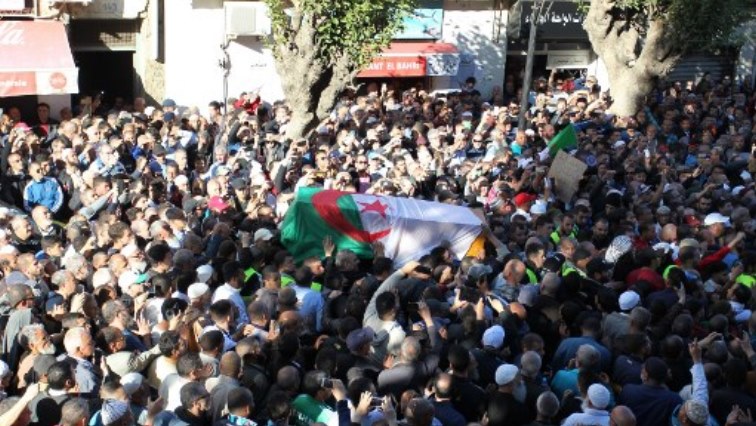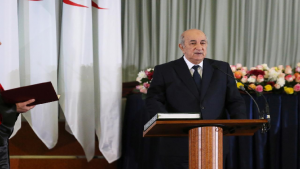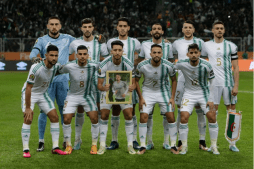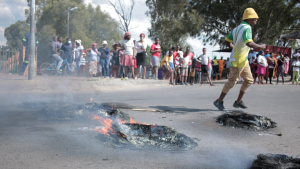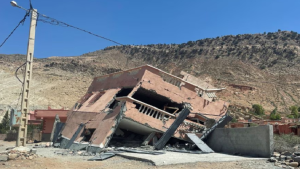Algeria’s army chief dug in Tuesday against protesters’ demands that transitional institutions be established outside the country’s constitutional framework, following president Abdelaziz Bouteflika’s enforced resignation earlier this month.
“Any change or amendment to… provisions (of the constitution) does not fall within the prerogatives of the army” but is the responsibility of the next president, General Ahmed Gaid Salah said in a speech.
The army “will not deviate from the constitutional path, whatever the conditions and circumstances”, said the military chief of staff, himself a pillar of the Bouteflika regime for 15 years.
Bouteflika resigned on April 2 after weeks of massive street protests, with former upper house speaker Abdelkader Bensalah later taking the reins on an interim basis, pending elections rescheduled from April to July.
But protesters demand the departure of Bensalah and Prime Minister Noureddine Bedoui, alongside other figures they see as a continuation of the old guard.
They also demand that transitional bodies be set up ahead of any election, arguing that existing institutions — and personalities — are too tarnished by corruption to guarantee a legitimate vote.
But Salah said on Tuesday that the July 4 elections — which fall within the timeframe allowed by the constitution — amount to “the ideal solution to end the crisis”.
– No ‘settling scores’ –
He also vowed that a widening investigation into Bouteflika’s inner circle would not descend into score settling.
Algeria’s military would ensure judicial investigations would not be subject to “pressure or decrees”, nor would they be “arbitrary or (involve) the settlement of scores”, he said.
Former prime minister Ahmed Ouyahia was on Tuesday questioned at court in the centre of the capital Algiers, as part of the ongoing corruption probe.
Private television channels broadcast footage of the unpopular Ouyahia’s arrival at court.
“Take Ouyahia to El Harrach,” the prison where five businessmen have been detained since early April on corruption charges, dozens of demonstrators gathered outside chanted.
“They should all go, they should all be held to account,” read banners carried by the protesters, as anti-riot police were deployed in strength to guard the court.
Ouyahia left the courthouse on Tuesday afternoon and did not say anything as he departed, an AFP journalist said.
The former prime minister is the latest prominent figure to be caught up in a probe launched by prosecutors since the ailing Bouteflika — who has rarely been seen in public since he suffered a stroke in 2013 — was forced to step down.
Finance Minister Mohamed Loukal, a former central bank governor, was questioned at the same Algiers court on Monday over suspicions of “squandering” public funds.
Salah said the defence ministry was aware of several serious corruption cases, involving “huge” theft of public funds.
He said the security services had left the cases at the “disposal of the justice system”.
Ouyahia and Loukal were both summoned on April 20 for questioning by prosecutors.
Ouyahia served four times as prime minister from 1995, three of them during Bouteflika’s two-decade rule.
He was finally abandoned by his longtime master on March 11 in a last-ditch bid to hang on to power.
Loukal was appointed finance minister at the end of March after Bouteflika named interior minister Noureddine Bedoui to replace Ouyahia as prime minister.
– Multiple arrests –
Former police chief Abdelghani Hamel was also questioned separately on Monday as part of a judicial inquiry into alleged bribery, state media said.
Hamel — once tipped as Bouteflika’s successor before he was fired by the veteran leader in June last year — appeared in a court in Tipaza, west of Algiers, before being released, the official APS news agency said.
Since Bouteflika’s ouster, investigators have cracked down on alleged graft, zeroing in on the activities of prominent politicians and businessmen following two decades of cronyism under the veteran president.
High-profile figures targeted in the past week include the North African country’s richest man, Issad Rebrab, who was reportedly detained on allegations of false customs declarations.
The head of the vast state oil firm Sonatrach, Abdelmoumen Ould Kaddour, has been fired and replaced on the orders of Bensalah.
Four brothers from the influential Kouninef family, close to Bouteflika’s brother Said, have been arrested over alleged non-compliance with state contracts, according to official media.
After pushing Bouteflika to quit with mass demonstrations launched on February 22, protesters have kept up their rallies, as they push for more than just cosmetic change.
The International Crisis Group think-tank last week expressed scepticism about Algeria’s anti-corruption drive, charging that the regime was using it to “settle internal scores”.
Algeria ranks 105 out of 180 on Transparency International’s 2018 corruption perceptions index.
On Tuesday, it was the turn of thousands of students to hold protest marches through central Algiers and several other cities.


